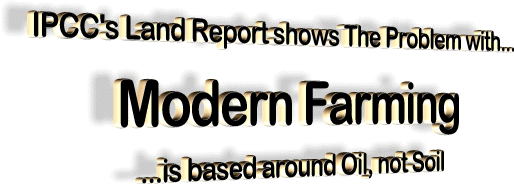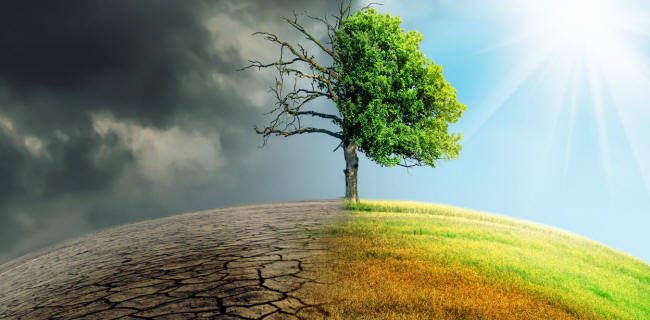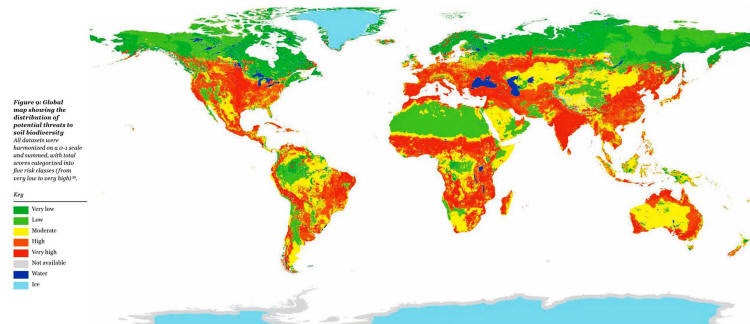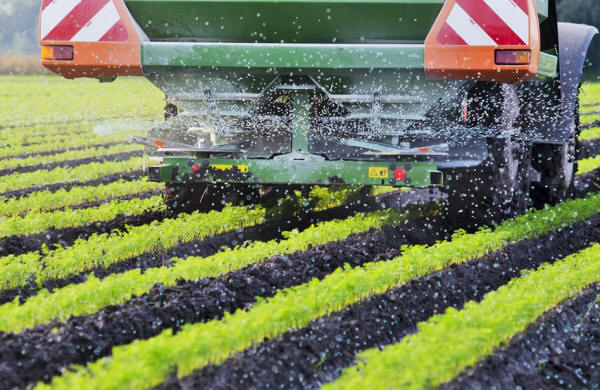|

by Anna Krzywoszynska
August 8,
2019
from
TheConversation Website
|
Anna
Krzywoszynska is an Associate Director of the University
of Sheffield Institute for Sustainable Food.
She
is also a social science consultant to the Sustainable
Soils Alliance.
She
had received funding from the Leverhulme Trust. |

The word "climate" makes
most of us look up to the sky...
However, the IPCC's new
special report on climate change and land (Climate
Change and Land) should make us all look under our feet.
Land, the report
shows, is intimately linked to the climate...
Changes in land use
result in
changes to the climate, and vice
versa. In other words, what we do to our soils, we do to our climate
- and ourselves.
The first part of the report makes for difficult reading.
Humans, it says, now
exploit more than 70% of the Earth's ice-free surface, and more
than a quarter of land globally is suffering degradation as a
result of human activities.
Soil is being lost up to 100 times faster than it is formed, and
desertification is growing year on year. Temperature increases
and heavy rains associated with climate breakdown are further
degrading already damaged soils.
All this is already causing
food insecurity,
and unless action is taken the impacts will only get worse.
The report states that
unless we stop and reverse land degradation, food supply chains will
become unstable, and nutrient levels in foods will decrease.
These impacts will hit
those living in precarious situations and in poverty the hardest,
but the effects will be felt around the globe.
From soil to
oil
How is it possible
that soils have become so degraded?
Don't we need well
functioning soils to produce food?
The truth is, the modern
farming system is based around oil, not soil...

Global distribution of threats to soil biodiversity
(red =
high risk).
Global
Soil Biodiversity Atlas
For most of our history, humans could only produce as much food as
the local ecological and soil conditions could support.
Every time a crop was
taken from the fields, nutrients were removed, making the soil less
fertile. To cope, some societies developed complex and sustainable
systems in which nutrients were returned to the soil in the form of
organic waste.
Using the local
environment and labour to maintain soils in a good state was the key
to survival.
Modern farming, in contrast, has been shaped by the
power of fossil fuels.
The problem of limited
soil fertility was overcome through fertilization,
...mainly with
synthetic nitrogen, which is made using natural gas or coal.
Today, emissions from
nitrogen fertilization are a major source of greenhouse gases,
and the emissions produced in making that nitrogen are the biggest
carbon cost in a loaf of bread.
In addition, the development of diesel-powered machinery made it
possible to cultivate land which was previously inaccessible. As a
result, more land is brought into cultivation, further destroying
natural ecosystems such as forests.
As the IPCC points out,
deforestation is indeed the biggest source of agriculture-related CO2
emissions.
Machines and fertilizers enabled more intensive farming, in which
organic material is not returned back to the soil and organisms such
as earthworms and microbes which make soils function are constantly
disturbed through ploughing and compaction.
Such intensive farming
leads to soil degradation and exhaustion...
Coming back to
land
Until recently, the "tractors and chemicals" recipe for food
production served humanity well.
It drove huge
increases in global yields, and made the human population boom
possible.
But today the extent
and severity of soil degradation through human over-exploitation
is such that no amount of chemicals and machinery can compensate.

This has served humanity well…
but
left us with degraded soils.
Aleksandar Milutinovic/shutterstock
In Australia, years of irrigation have turned soils saline and
toxic to crops.
In the UK, the
drained peat-land soils of
the Fens, which produce the
most high-grade foods, are disappearing at a rate of 2cm a year.
Spain, a huge
producer of fresh fruits and vegetables, is in danger of
desertification due to increasing temperatures and droughts.
In sub-Saharan
Africa, a quarter of the land is degraded.
20% of China's soils
are polluted.
Across the world,
soils have been pushed beyond their capacity to recover,
and humanity's ability to feed itself is now in danger.
To ensure that we eat well and live well in the future, we'll
need to reverse the trend towards greater homogenization
which
drove food systems so far.
The future is localized
and diverse, because while the "tractors and chemicals" recipe
worked well across the world, at least for a time, there is no easy
solution for sustainable land use.
The IPCC report recognizes that reversing land degradation is a
socio-ecological issue, and one that requires locally appropriate
action. It stresses the importance of land rights and secure access,
driving home the message that land and its peoples are
indivisible...
Going forward, what does "restoring land" mean for our food systems?
It means supporting
the invaluable bottom-up experimentation being practiced by
farmers and land managers and helping them develop and share
their expertise.
It means making sure
that public subsidies to agriculture support restorative farming
practices.
It means working with
big buyers and farmers to encourage land-stewardship and growing
a greater diversity of crops.
It means putting
soils and their health at the centre of all land policies.
Regenerating land is a
win-win, for humans and their ecosystems, if we dare to look beyond
the immediate short-term horizon...
| 



